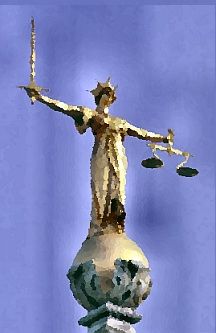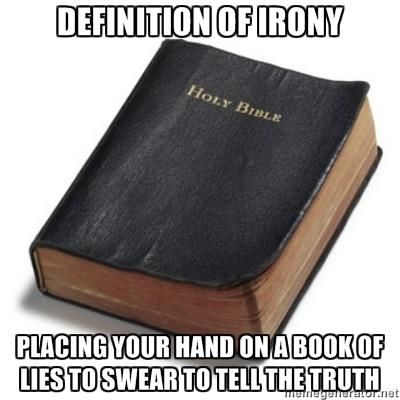
Various rights associated with a fair trial are explicitly proclaimed in Article 10 of the Universal Declaration of Human Rights, the Sixth Amendment to the United States Constitution, and Article 6 of the European Convention of Human Rights, as well as numerous other constitutions and declarations throughout the world.[from Wikipedia]
I think we can safely assume that we (humanity) generally accept that for any crime, a fair trial is a human right, not merely for the accused but also for the social conscience benefit of justice being seen to be done. It is also generally accepted that when on trial for a crime, in courts based on British law at least, that the case’s evidence and testimonies should be assessed by '12 good men and true'. A phrase which, though now somewhat sexist, does succinctly encapsulate the concept of examination of the facts of the case before a jury of one's peers.
Now, that's all fine and dandy and, thus far, the most just method we have found to reasonably and fairly conclude a verdict but it’s the phrases "a group of one's peers" and, to a lesser extent, "12 good men and true" I'm going to address today.
From my point of view and, I suggest, also from the view of anyone who has never been exposed to scripture, there is no evidence whatsoever for the existence of any god. I would hope therefore that the only people who would be considered my peers would be those who have come, through a process of rational thought, to the same rational, godless conclusion.
If I were on trial, I find I would be extremely discomforted by the presence within the justice system, if not it's reliance upon, aspects of spiritual faith or, if you'll permit me, the holy ghost in the machine. I'll try to explain why.
A rational atheist will happily state that there is no evidence for god(s), whereas a devotee of a theistic faith is unlikely even to admit the lack of evidence, let alone honestly concede "There’s no evidence of god but I choose to believe regardless", and most would even argue that there is evidence, obtained via application of a commonly known religious principle "Some things must be believed to be seen".
But this is a poor principle, as I see it, it means only "You must first pretend, before you can extrapolate circumstantial support." Any human who believes there is a god, is therefore stating merely what they pretend, or would like, to be true.
Any individual who is willing to swear on a theistic 'holy' book is clearly making a declaration that they hold god(s) as a fact. If, to them, god was not a fact then the notion of swearing on that god's 'holy' book would be irrelevant, preposterous or even offensive.
From my point of view, any individual who holds as a fervent fact that for which there is no evidence is guilty of irrational thought. The evidence for god is unavailable yet they have concluded, because of a novel they once read or, more commonly, of which they were told the bullet points, that the novel's fictitious content is the truth of reality. So, isn't it also right to consider anybody appearing at a trial and happily swearing on a 'holy' book, as incapable of rational judgement? Also, I’d suggest any human who expects a person to swear on a theistic 'holy' book is in full acceptance of this "let's pretend" view of reality, an irrational act which makes them complicit in the delusion.
Might one rightfully assume that, when examining trial evidence, a juror who has got ‘the faith’ is also capable of finding links and causes where there are none? As they have managed to find in favour of god despite the complete lack of evidence, might they also apply the same shoddy reasoning to the crimes of a little human "sinner", a word of faith not of rationality, and just as easily find against the accused for their faith's views on the sin, as much as for the facts of the case?
As people of faith may already ascribe, not only the label 'sin' but also the concept of that sin and its scriptural punishment, to the crime, have they not already committed a level of prejudgement?
So, in a situation where the weighing of evidence and conclusion thereby of a rational verdict is the prime requirement, how can any rational human trust the judgement of a juror who has ‘the faith' and professes god as a fact? They have proved they have no idea how to properly, rationally and dispassionately come to a balanced judgement by their own admission; they hold true that for which there is no evidence unless first one pretends there is. So, why should their judgement be considered valid?
Speaking of Judgement, the need for the individual to be afforded a fair trial should also extend to the judge. How could one expect a judge, who holds god as a fact, to judge the case rationally? The judge's tendency towards irrational choices displayed by his decision to follow that for which there is no evidence could be repeated when judging the trial’s evidence. The prejudgement of the sin point also applies here; the judge may consider how his god will view his judgement - to put it simplistically - "If the punishment is insufficient will my god be angry with me?"
As a further thought, no matter how sincerely a person of faith proclaims "my faith will have no bearing on my ability to assess the facts of the case", how can their proclamation be trusted? Most faiths prohibit suspension of belief under the threat of eternal torture but even if they were courageous enough to brave that threat, even if they wanted to, just for the length of the trial, most devotees could not simply ‘switch off’ a lifetime’s indoctrination.
In the same way that one cannot trust charitable works by the faithful to be of truly altruistic motive because their conscience is continually held ransom by Satan’s shotgun, how can it be proved that their faith has had no bearing on evidence laid before them? I mean, whilst they continue to profess belief, they may not even be aware themselves, that their pretending has a bearing on their every thought. (There's a more in depth exploration of this in "Your point is Not Valid" if you're interested)
So, how does the phrase "12 good men and true" look now?
The "Good" part of the phrase…
The believer of a theistic faith which professes "peace and goodwill to all" is perceived by society as more honest than a rational atheist but as I've suggested here, the mere presence of their faith suggests they are considerably less so! In a Justice system weighted so heavily on a belief in a god, doesn't that eliminate the word Good from the phrase?
The "True" part of the phrase…
Swearing on a theistic 'holy' book is proof that the juror/witness etc. holds as a verified fact that for which there is no evidence whatsoever. Doesn't that eliminate the True Part of the phrase?
Where does that leave us? I mentioned the sexist nature of the phrase at the start so now we have…
"You have the right to fair trial by 12 humans;
any old humans will do,
neither they, nor the judge and witnesses need even be sane!"
A further exploration of this can be found in Travesty of Reason
There you go, that's my thinks...So next time you're are on trial, no matter the seriousness of the charge, don't forget to ask for a rational judge and jury. Maybe the ARC card will help you do that.
You never know, it could save your life!

Check out this video by Not 1 Delusion
"There's no evidence either way" - http://youtu.be/hwXyDLNTKWM
PEACE
Crispy
Crispy
Please leave a comment - Anything will do
The best communications are often,
THREE WORDS OR LESS
OR ONE OR MORE FINGERS!
Back to the Core TMQ
Two articles sparked my thoughts for this post, so I've included a couple of snippets as a grounding on where it came from.The best communications are often,
THREE WORDS OR LESS
OR ONE OR MORE FINGERS!
Back to the Core TMQ
Twelve good men and true?
Juries are a cornerstone of the British legal system. But can jurors' individual prejudices get in the way of a fair verdict? Jon Holbrook investigates
"The jury system puts a ban upon intelligence and honesty, and a premium upon ignorance, stupidity and perjury," Mark Twain said. A century later, most accept that juries have a rightful place in the criminal justice system, and few would criticise them with Twain's brutal language. But his concern about the jury's ability to reach fair verdicts on the evidence lives on.
Stop dribbling – your country needs you on the jury
Being tried by 12 good men and true sounds brilliant but if, God forbid, you were to find yourself in the dock charged with a crime you did not commit, would you want to be tried by 11 dinner ladies and Trigger from Only Fools and Horses? Or Wayne Rooney? Or Piers Morgan?
Speaking personally, I’d far rather plead my case in front of nothing but a judge. I know that some are a bit doddery, and that many live in houses with no central heating, but most are more astute than the alternative: 11 lunching ladies and Benny from Crossroads.
